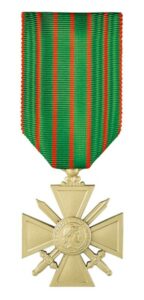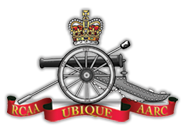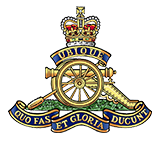France – Croix de guerre
 The Croix de guerre (English: War Cross) was created to recognize French and allied soldiers who were cited for their service during World War I, similar to the British mentioned in dispatches. Soon after the outbreak of World War I, French military officials felt that a new military award had to be created. At that time, the Citation du jour (“Daily Service Citation”) already existed to acknowledge soldiers, but it was just a sheet of paper. There are three distinct Croix de Guerre medals in the French system of honours: Croix de guerre 1914–1918, Croix de guerre 1939–1945 and Croix de guerre des théâtres d’opérations extérieures (for wars other than World War I and World War II not fought on French soil). There are are also additional levels within each of the three: a bronze star for citation in the Order of the Regiment or Brigade; a silver star for citation in the Order of the Division; a vermeil star for citation to the Order of the Army Corps and a bronze palm for citation to the Order of the Army. A silver palm replaces 5 bronze palms.
The Croix de guerre (English: War Cross) was created to recognize French and allied soldiers who were cited for their service during World War I, similar to the British mentioned in dispatches. Soon after the outbreak of World War I, French military officials felt that a new military award had to be created. At that time, the Citation du jour (“Daily Service Citation”) already existed to acknowledge soldiers, but it was just a sheet of paper. There are three distinct Croix de Guerre medals in the French system of honours: Croix de guerre 1914–1918, Croix de guerre 1939–1945 and Croix de guerre des théâtres d’opérations extérieures (for wars other than World War I and World War II not fought on French soil). There are are also additional levels within each of the three: a bronze star for citation in the Order of the Regiment or Brigade; a silver star for citation in the Order of the Division; a vermeil star for citation to the Order of the Army Corps and a bronze palm for citation to the Order of the Army. A silver palm replaces 5 bronze palms.
Croix de Guerre with Palm
Brigadier George Edwin (Ted) Beament
Brigadier Harold Oswald Neville Brownfield MC
General Henry Duncan Graham Crerar CB DSO
Brigadier Charles Mills Drury DSO
Lieutenant-Colonel Robert Ernest Hogarth
Major-General Ralph Holley Keefler CBE DSO ED
Lieutenant-General Guy Granville Simonds CB DSO
Lieutenant-Colonel Charles Edward Woodrow ED
Croix de Guerre with Silver Gilt Star
Major Edward Geoffrey Brooks DSO
Captain Edwin Pearson Delmar Cavendish
Captain Alwyn George Faulkner
Captain Alfred Thomas Patrick Gilbert
Captain Samuel George Mcdougall Grange
Captain William Patrick Hair
Major John Murray Hockin
Captain Robert Hume King
Captain Alan Melville
Captain John Romeo Milani
Captain Joseph Henri Moss
Major AB Plene
Major Edward Cecil Scott
Captain Norman Dyson Slater
Captain Sydney Helmer Stander
Captain Peter White
Croix de Guerre with Silver Star
Lieutenant James Evans Cameron
Warrant Officer Class 1 Herbert Craig
Lieutenant John Robert Flowers
Lance Bombardier Douglas Lester Gillespie
Gunner Paul Emile Leclerc
Lieutenant Hugh Gerald MacAdam
Captain Edgar William MacDonald
Warrant Officer Class 2 Cecil Alexander Moffatt
Lieutenant James Paul
Captain Thomas Wilbert Platt
Lance Bombardier Frederick Arthur Samuel Ryder
Captain Pierre Sevigny
Lieutenant James Edward Assheton Smith
Lieutenant Archibald Eric James Sudbury
1. This officer was employed from 7 Jun 44 as Courier officer for Cdn Sec GHQ 2 Ech 21 A Gp.
2. During June, July & August 1944, his duties included:
(i) Liason between Adv Rft Control Officers of 2 Ech and the HQ of Adv Sec, Cdn 2 Ech in the theatre.
(ii) Carrying of despatches between Adv Rft Control officers and Adv Sec.
(iii) Carrying of despatches for 2 Ech and CMHQ to Naval Despatch Boat.
(iv) Conveying of verbal messages to various Staff Officers at Fmn HQs.
3. From 8 Jul to about 16 Jul during the period of the attack and fighting around CAEN, it was this officer’s daily duty to carry despatches over a stretch of territory which was under direct enemy observation and fire. This involved travelling by motor cycle or jeep over an exposed road constandly under fire, and offering no possibility whatever of obtaining cover. He set out on his run each time, knowing that this road had to be traversed but showed no hesitancy in this task and always got his despatch through.
4. In addition, during the whole of the fighting round CARPEQUET, CAEN and the FALAISE GAP, his duties continuously took him through dangerous spots in which it was impossible for him to take measures to obtain cover or protection. His duties were always carried out cheerfully and with no regard for his personal safety, and he was always willing to assume additional tasks of the same nature, over and above his normal duties.
Sergeant Robert Earl Tinsley
Croix de Guerre with Bronze Star
Gunner Jack Barlow
Gunner Edmund Barton
Sergeant Wilfred Thomas Jones
Gunner Clifford Henry Armand Capnerhurst
Gunner Frank Duchnicki
Sergeant William Verdun McIlveen
Lance Bombardier Lorne Robert Munce
Major Clarence Rene Ostrander
Gunner WD Rindell
Gunner Carl Philip Rouleau
Gunner Elmer Schauer
Lance Bombardier William Rolston Durno
Gunner Philip Albert Falconer
Bombardier Leslie George Furniss
Lance Sergeant John William Fyfe
Bombardier George Albert Grassick
Sergeant Herbert Henry James
Gunner Donald George Jamieson
Sergeant Alfred Edward Jones
Gunner GH Stevenson
Gunner Donald John Tiedemann
Gunner John Andrew Turner
Gunner Clarence George Westley
Croix de Guerre
Sergeant William Colin Chisholm MM
Major Frederick Thomas Coghlan DSO
Lieutenant-Colonel Lawrence Vincent Moore Cosgrave DSO
Colonel Charles Stuart Craig DSO MC
Lieutenant-Colonel William Wasbrough Foster DSO
Major James McKerras MacDonnell MC
For Gallantry and Distinguished Service in the Field.
Sergeant Walter MacInnes DCM
Captain John (Jack) Neil McEachern MC
Battery Sergeant Major Samuel Turner Moore
Sergeant William Cannell Plews
On the 8th Aug. 1918, during the attack on VILLERS-BRETONNEUX, his battery was ordered to advance to close support of the infantry, by his courage and disregard of danger in finding a way across barbed wire entanglements and enemy trenches. His energy, Judgement and coolness was of great value in the attack.
Lieutenant Edward Merritt Slader
Colonel Edward Cecil Scott ED CD
Captain Robert Grant Thackray MC


